Extreme pedagogy: “We teach” about working with children on long-term treatment
Today we want to answer the question "Do I need a full-fledged school education in clinics where children are on long-term treatment, what should it be?"
Let's start with the facts. In our country annually over 250 thousand children undergo long-term treatment in clinics. The most severe cases are organ transplants, oncology. At the same time, in our country, according to statistics, in 80% of cases, pediatric oncology is completely cured, unlike adults, where it is about prolonging life. The treatment and rehabilitation of such children is a long process that lasts for months and sometimes years.
We want to tell you a story about amazing schools and the people who live by them, and about those for whom this project exists - children and their loved ones. For them, school is not only education, it is HOPE for the future and great courage!
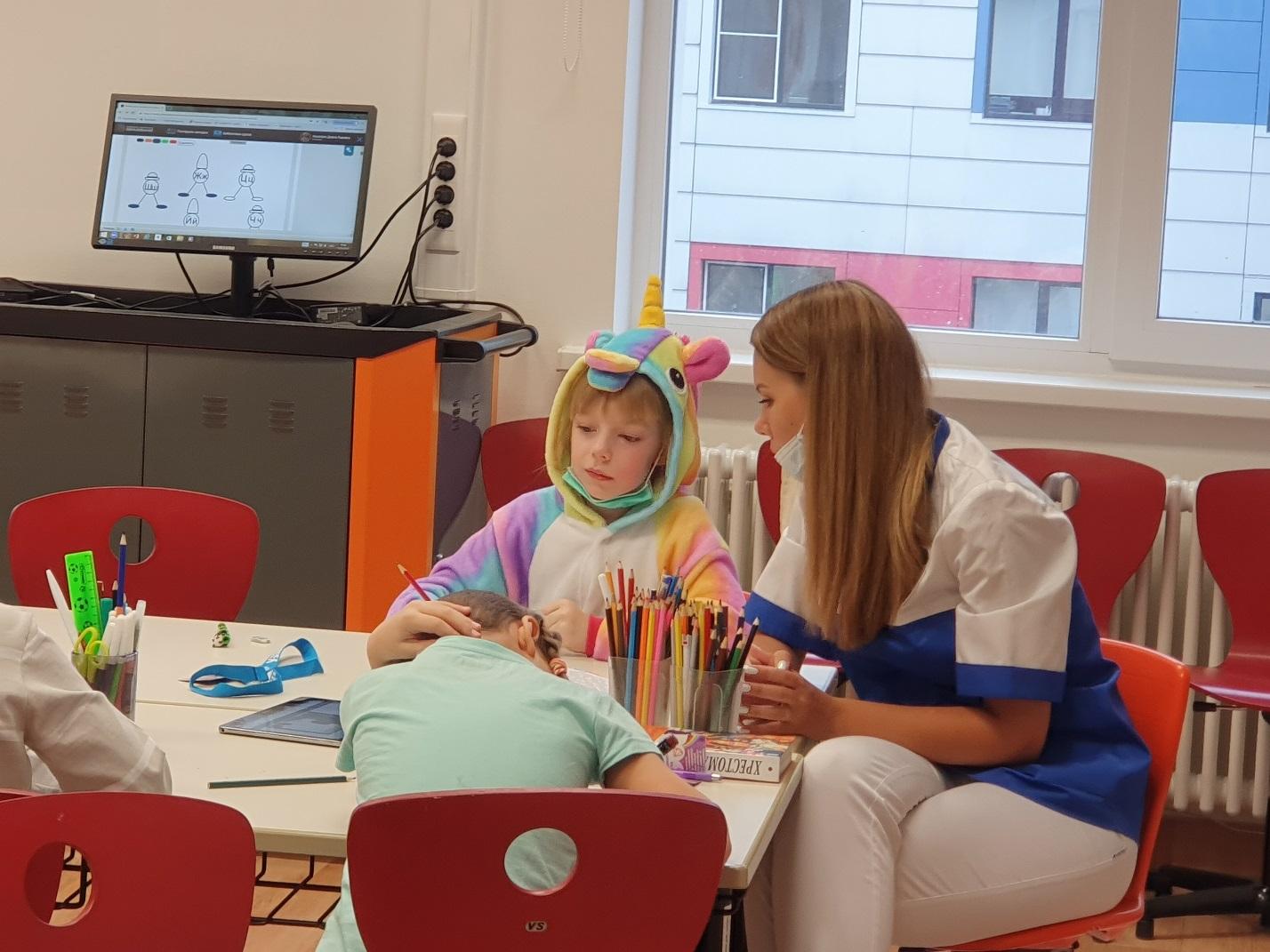
Teacher Perushkina Alexandra Pavlovna works
A breakthrough in the treatment of children with malignant neoplasms occurred in the 90s of the last century, when Western protocols and methods of intensive treatment of childhood tumors came to Russia. Today, oncologists have achieved impressive treatment results in large centers: with lymphoblastic leukemia - 80% of the cure, with some of its types - more than 90%, with Hodgkin's lymphoma - almost 95%, with Wilms (kidney) tumor - almost 90%. In addition, the quality of diagnostics has improved in the country: in 2018, according to RBC, 26.9 thousand children were registered with oncologists, for comparison, in 2008 it was 16.6 thousand.
And so, having passed through trials and defeated a serious illness, the children returned home. And at school, they face new stresses due to lagging behind the school curriculum and the inability to return to their native class with friends. And if exams are coming at the end of the year, then you can say goodbye to the dream of successfully passing the exam and the exam.
In 2014, Sergei Vitalievich Sharikov created the UchimZnayem educational community to solve the issue of affordable full-fledged education for students undergoing long-term treatment. With Samsung technical support, the first school was then organized on the basis of the Dmitry Rogachev National Medical Research Center for Pediatric Hematology, Oncology and Immunology in Moscow.
For 5 years, the UchimZnayem project was able to achieve a lot, for example, they achieved that children in clinics were allowed to pass state certification exams. With the support of federal and local governments, schools have been opened in clinics in 19 regions of Russia: Moscow and the region, St. Petersburg, Astrakhan, Voronezh, Zabaykalsky Krai, Kaliningrad, Leningrad, Oryol, Rostov Regions, Sverdlovsk Region, Krasnodar, Krasnoyarsk, Perm, Primorsky and Khabarovsk Territory, the Republic of Komi, Sakha, Udmurtia, and their number continues to grow. Today in Russia there are already 33 classes of the project.
It’s impossible to say better why hospital schools are needed, the inspirer and leader of the project, Honorary Worker of General Education of the Russian Federation Sergey Vitalievich Sharikov: “When we started to rebuild the system of hospital pedagogy in our country, we immediately realized what should be wrong. School is about life, and not only and not so much about passing the exam.
You see, when something hurts, often because you don’t want to see anyone, you want to go under the covers and close. And our system should lead to the fact that the child, if he can get up, get out of bed, comb his hair, wash, go out into the hallway, into the classroom. We must be more than education by our system. We must show that life goes on, no matter what.
We are trying to answer the question, which at first seems absurd: "What can be good in a children's hospital?" A good must be found! Since this happened, since you are here for a long time. It’s impossible to think about the bad all the time: our “caring school” should become such a good friend, who, like an outbreak, should “ignite” the child, and parents too, to distract from focusing on health problems ”
Let's look at the construction of one such hospital school in the center named after Dima Rogachev.
Dmitry Rogachev National Medical Research Center for Pediatric Hematology, Oncology and Immunology is located in the south-west of Moscow. Often, children cannot receive high-tech treatment of the appropriate level in their region, and therefore they are sent for free treatment to this center. The UchimZnaem school is a structural unit of the Moscow school No. 109, which is headed by an academician of the Russian Academy of Education, Ph.D. Evgeny Alexandrovich Yamburg.
Sad fact: the medical center is almost always close to 100% full. The center is able to receive up to 700 primary patients per year, and cancer in Russia is diagnosed for the first time in more than 5,000 children annually.
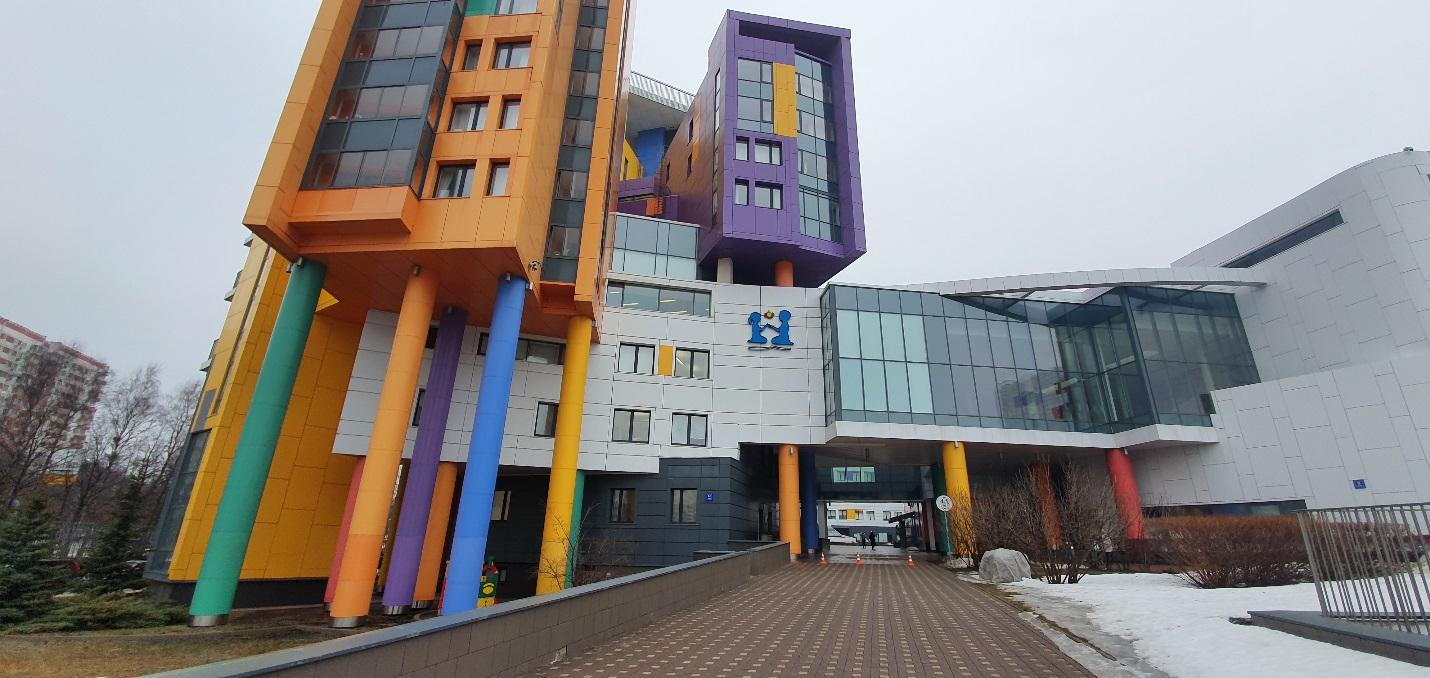
The center has the most advanced equipment, its construction took into account modern standards. During treatment, children can live in rooms that are suitable for living with a close adult. For obvious reasons, this is incredibly important for regional patients sent to Moscow for treatment, whose relatives have nowhere and expensive to live in the capital.
The design of the school wing of the center is designed in bright colors.
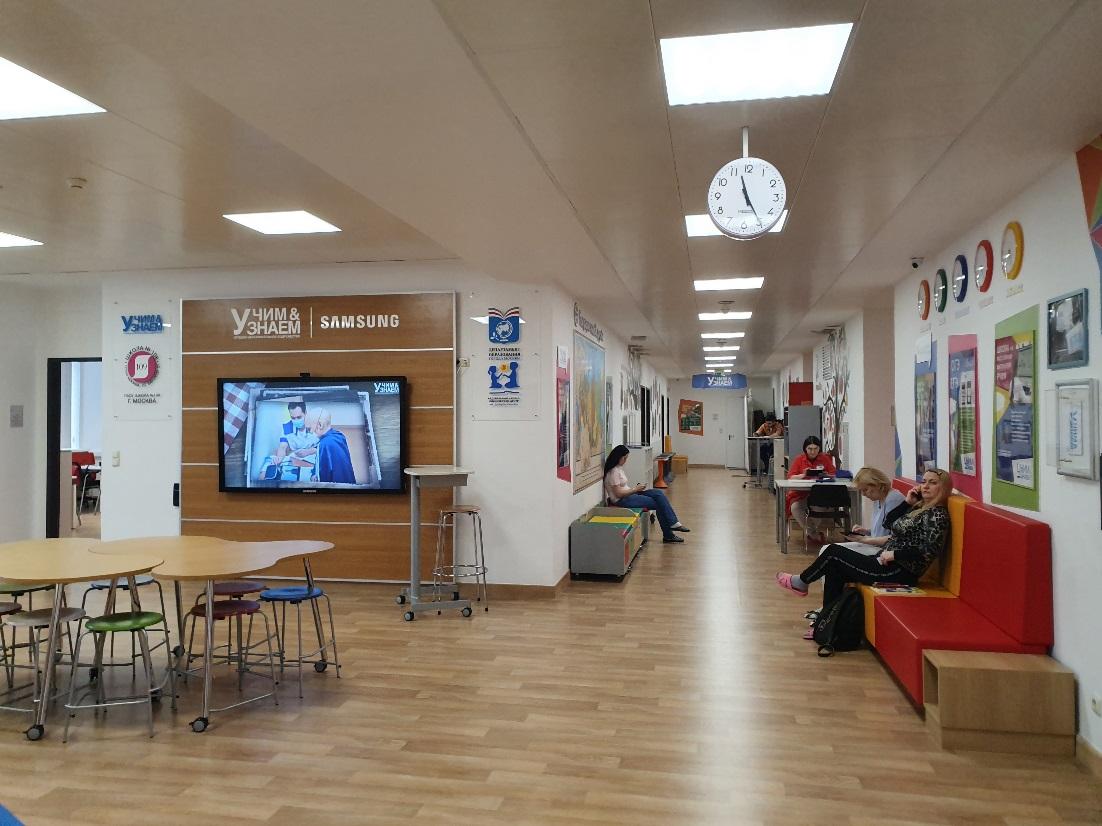
Visitors to the center can have a snack in a cozy cafe.

There is a very bright game room:

To fight for life, you need to love it!
In preparing this material, we talked with the teacher Elena Kuznetsova, thank you very much for the time taken.
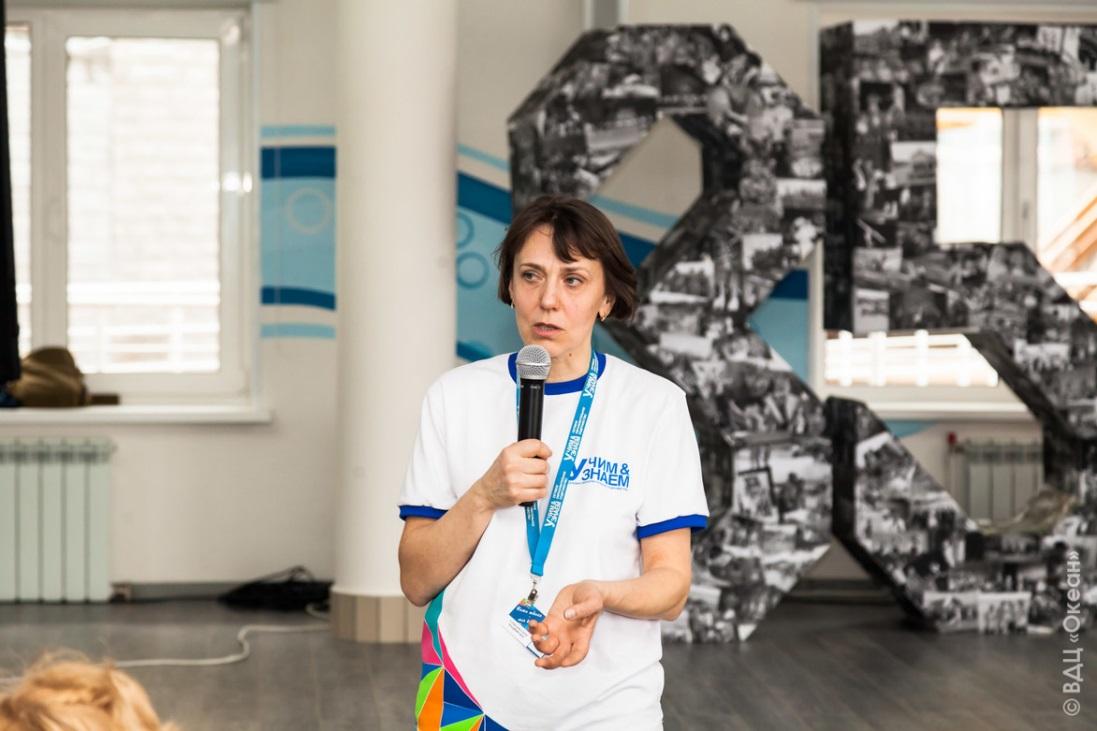
Photo source: All-Russian Children's Center "Ocean"
Elena Kuznetsova, teacher-tutor of mathematics at the flagship school at the Medical Center. Dima Rogachev. She is one of the main Russian speakers on the topic of rehabilitation pedagogy at major educational conferences. Winner in the special nomination "For long-term and creative work with children who are on long-term treatment in children's hospitals" of the competition "Teacher of the Year 2017". When you are near, you involuntarily wonder why some people have many times more internal energy? Where does it come from? Who can work in a hospital school?
In an interview, Elena said: “My indefatigable energy in another place annoys people, but there is an application, there are always few. Here, like a black hole, here you can give, give and give. These children, they absorb like sponges, they absorb your vitality, they absorb your love for people, for the world. That's all there is - they absorb, they miss theirs because of the difficult treatment, and therefore that's how much you are willing to give, so much they are ready to take. ”
According to Elena, any situation needs to be able to be turned into a pedagogical one. Those realities that teachers in such a center face daily:
Read Elena ’s article “Seven Challenges in Hospital Education” .
And another quote from Elena: “There is no concept of an oncological teacher ... we must very accurately understand what the child experiences at each stage of treatment in order to help him overcome these problems. Because if he has chemotherapy, he just forgets everything. If at this moment you try to give tasks for memory, we will fail. Okay, we, child, we not only injure him, but practically push him in this direction. And we have to do this: "Yeah, you have chemistry, so today we are engaged in art mathematics, we draw graphs." So we study constantly, we collect bit by bit "
When asked about burnout, Elena replies: “When do people burn out? When they start to close. Everyone has their own ways to escape. For someone it comes in a year, for someone in five, for someone it doesn’t come at all. There are ways to restore: psychologists work, there is a Playback Theater (experiencing personal stories through playing them in actors in an improvisational theater - approx. Ed.) ”
Elena Kuznetsova says that people who work in such places, in a different way, should feel other people more acutely: “You pass by, and there in the corridor are mothers, sometimes mothers of those children whom I don’t even teach. In a normal situation, one could pass by. Here I’m not something I can’t afford to ... it’s natural to communicate with mothers, empathize with these children, react to the state of the child, and evaluate feedback. You can’t work here if you don’t give. ”
In a hospital school, a teacher becomes partly a doctor: willy-nilly, you need to know what happens to the patient. Medical lectures are held here. For example, just at the time of the interview, a lecture was held about T cells, about cancer immunotherapy - this is something new that happens in medicine, for which James Allison and Tasuko Khondze received the Nobel Prize in 2018.
The idea of immunotherapy is to train immune cells to fight cancer (you could say to program them). After all, how is cancer? In general, every person has cancer cells. The question is what the immune system does with these cells. It is believed that cancer is a disease of the age when errors accumulate, i.e. to die of cancer at 80 is natural. But then why do children fall ill with oncology? It is still not known exactly, but there are studies that suggest that it does not depend on living conditions, unlike adult oncology, violations are laid back at the time of embryonic development. Therefore, pediatric and adult oncology have a different course of the disease and a different percentage of recovery.
Families with children with cancer really need information. It is important for children and their relatives to talk about the disease in a popular way, to explain the complex treatment process, so that they become conscious medical assistants in their own recovery. Special books are published, such as in the Charity Book Aid series. Here, for example, is the wonderful book “Crank”, where in the format of a story about a sick boy, Crank and his mother explain in simple terms what a biopsy, catheter, tomography, chemotherapy are. Its author is the hematologist Anastasia Rudneva, and she also works in this center.


You can download this and other books on the Book to Help website for free, and useful tips are also published for those who want to help, for example, “How to Support If Your Child Has Cancer” .
In the schools of the “Teach-Know” project , everything is built so that treatment and study can be combined.
In the process of oncological treatment, there are periods when a child, due to reduced immunity, must sharply limit contact with the outside world in order to protect himself from infections (therefore, patients and visitors wear masks).
And here the distance learning technologies are perfectly suited: tablet, headphones, and more! A lesson can be held individually with a teacher or even as part of a group: during a lesson in a classroom, you can connect to it remotely.
Or another situation: the child has a pause in treatment, and he went home. How to ensure the continuity of the educational process? Again, an online educator is involved with him.

Elena Kuznetsova conducts a lesson on Skype. Source: onkobook.ru
The use of tablets, an electronic board in classrooms is associated with the requirement of sterility (a book cannot be decontaminated, for example).
Classes are very interestingly arranged. In one class, several children of different ages sit at once, and each is engaged in their own subject. For example, here in the photo: a mini-group of preschoolers goes through the theme of “letters”.

At the blackboard - Khachatryan Diana Lvovna, engaged with a child in the foreground - Atly Oksana Borisovna
At the same time, other older children study Russian language and literature - and each has his own teacher nearby (pictured is the boy on the right). That is, this is an individual training, but at the same time everything is in one room, and there is no feeling of isolation and loneliness.
And here there is almost coworking, where the guys, even with a dropper connected, can come to study with a teacher, the atmosphere here is very free.

Works teacher Kurilovich Natalya Sergeevna
For obvious reasons, they can’t put many lessons a day. Here is an example of a girl’s 9th grade schedule — no more than three lessons per day.
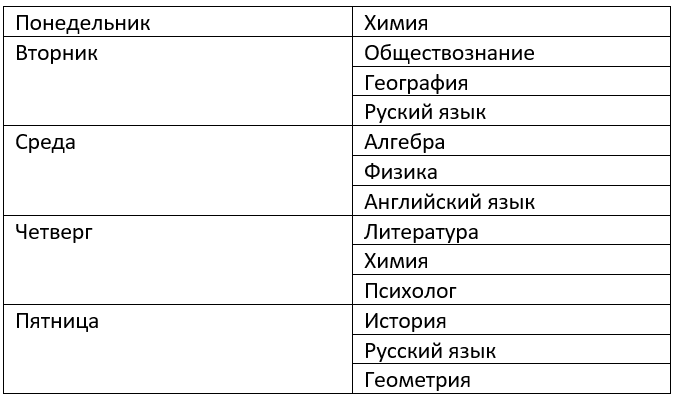
In teaching mathematics at Elena, the Lego constructor proved himself very well. On it, you can explain the fractions, and the radius with a diameter using the wheels of a typewriter as an example, and go to physics through speed and time.
Elena explains: “Lego” is good here, because children with such treatment have a problem - deprivation, including kinesthetic - and they are returned to the world of sensations through a game with a constructor. Instruction - assembly: eye-hand connection, this is also lost in case of illness, and this can also be returned through classes.
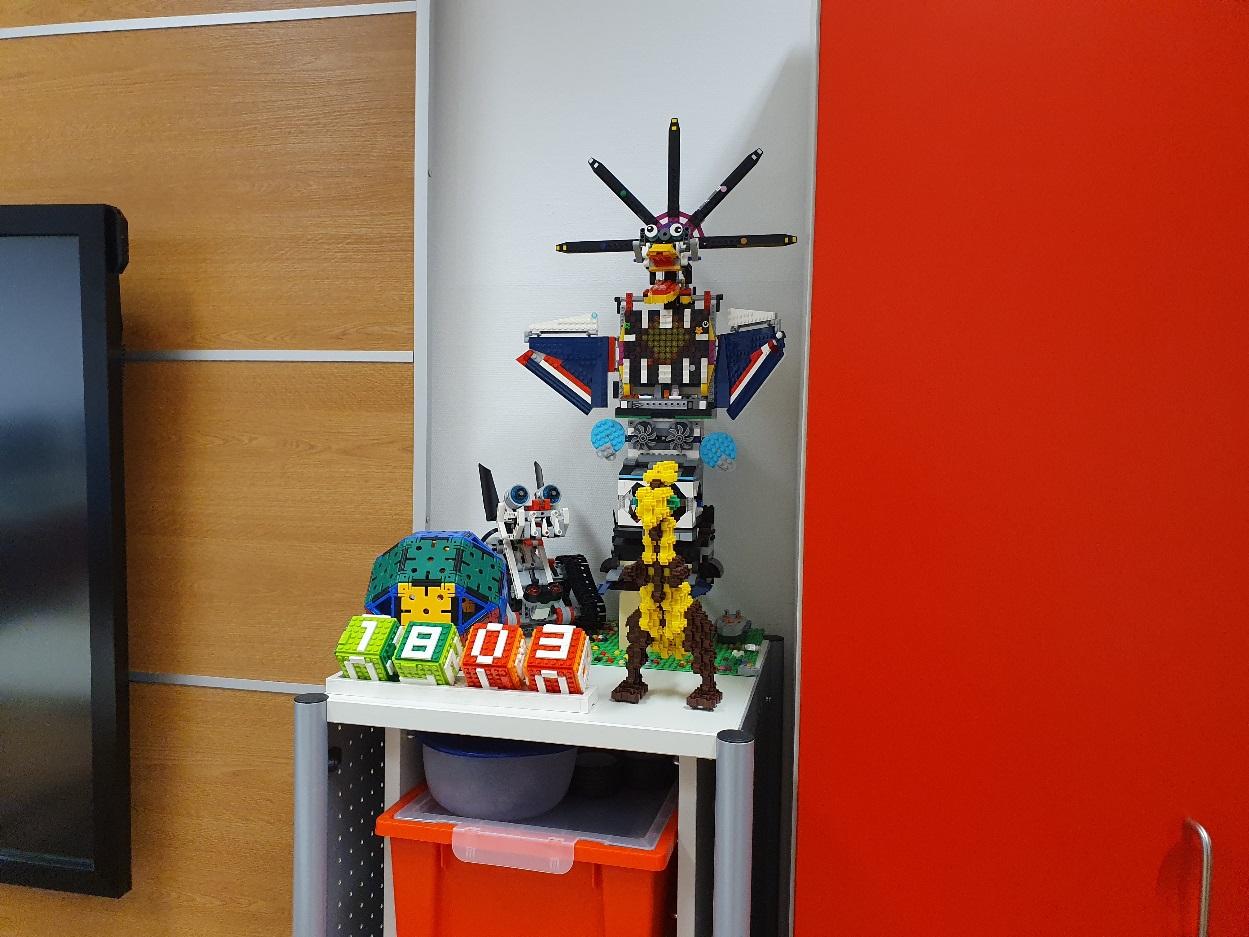
Another important point why Lego is used is motivation. And healthy children often have a dislike for mathematics, and here there is a huge physical and psychological fatigue. And they need to be interested in the game. Which child will refuse to play at school? And they not only play, but they themselves come up with tasks: and let's do the assembly for a while? And let's do the assembly in pairs? In pedagogy, this is aerobatics: when a child sets a pedagogical goal for himself.
For older children there is even a “smart greenhouse”: relays, pumps, microcomputer board. True, there was a small incident with the greenhouse: it was moved from another place, but here, in a hospital school, nothing can be grown: this is the requirement of doctors. Therefore, now we think that it is possible to do interesting things with it, so that without plants.

Educational robotics for rehabilitation tasks here has an understandable and logical application: ergonomic (there are no jagies, irregularities), methodically and design-designed, convenient, compact. I took a box with me and went to the lesson.
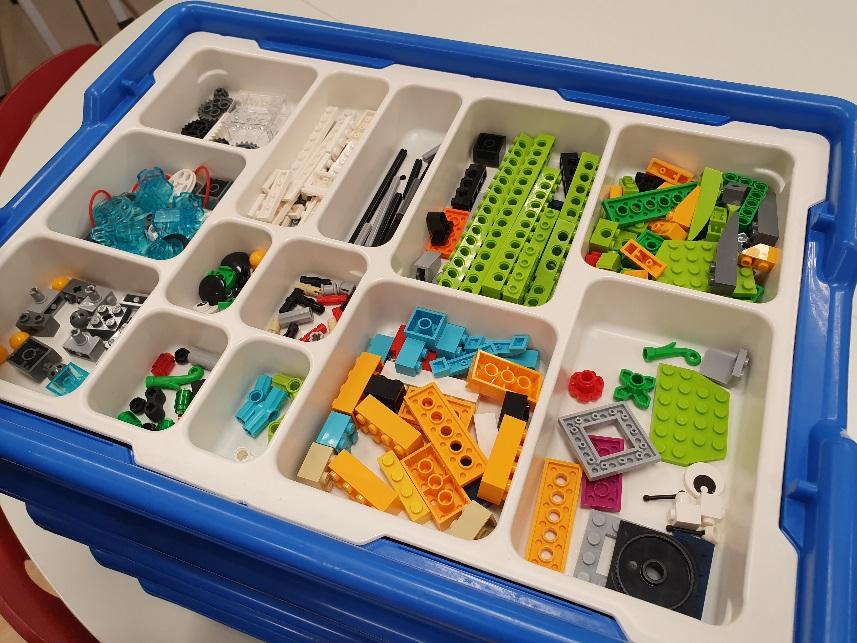
In Elena’s lesson, using a constructor, she was assisted not only by her second teacher, Nikita Korovin, but also by a girl named Masha, who herself was not much older than the students. It turned out that Masha was a new tutor, and she wanted to go through something like a pedagogical internship with Elena.
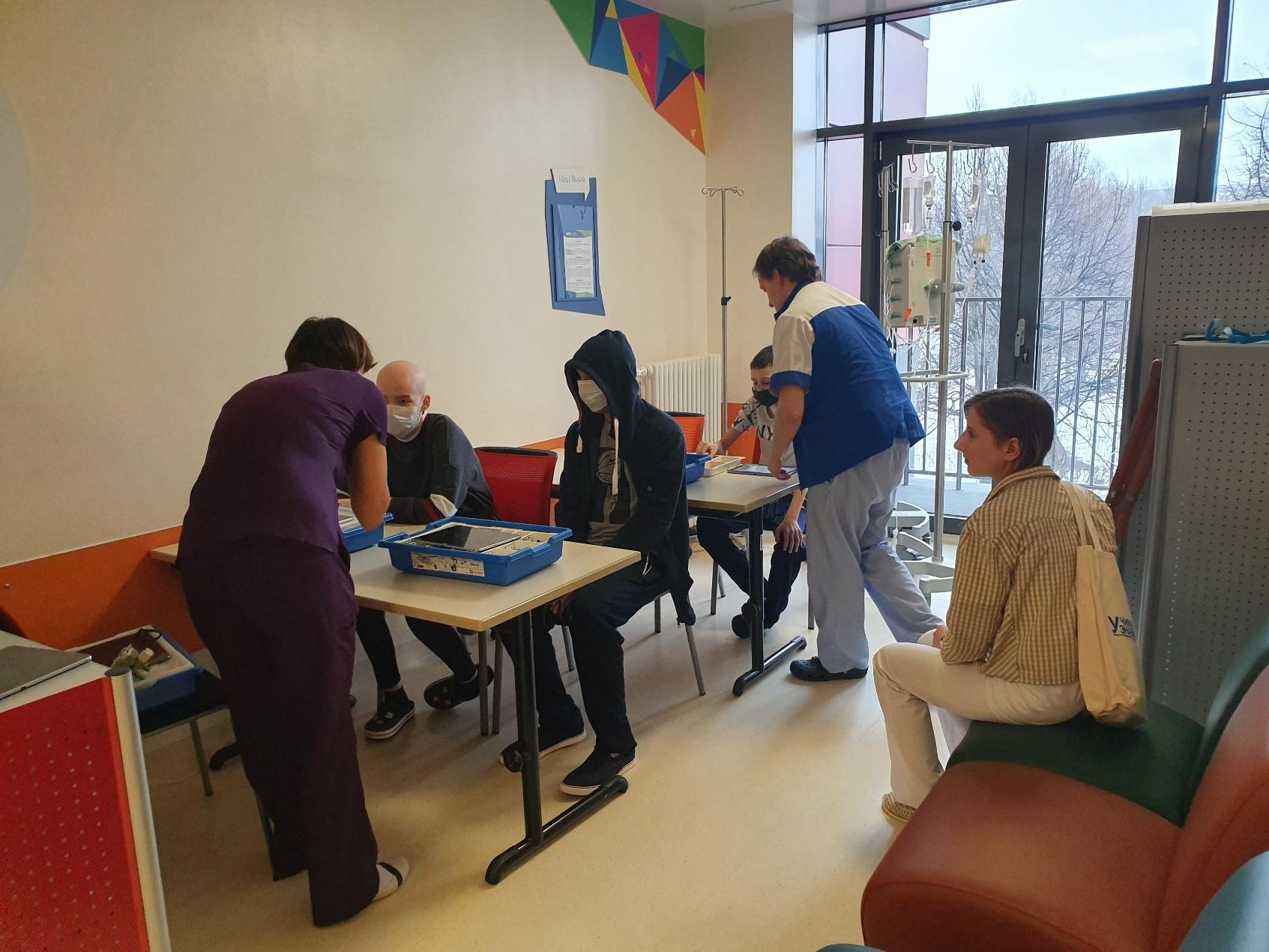
And Nikita said that he and his colleague are now doing a set of laboratory work in physics using Lego and demonstrated one of the lessons - the concept of leverage. Children are madly in love with conducting physical experiments and finding out how physics is in their environment.
As you may have noticed, the methods that we see in the hospital school are generally needed by all children: an individual approach, learning space like coworking, distant learning, mentoring. Here, these decisions are worked out with many external constraints, in changing and difficult conditions, and become a vital necessity. It would be useful for everyone who works with children to get acquainted with hospital pedagogy.
The caring school has a well-equipped audio studio where children can try themselves as radio hosts. The idea is to help children compensate for cognitive loss (due to chemotherapy) and recover over time. Regular classes are important for this, you need to read aloud, repeat, recite verses.
And another idea that comes to mind is the theater. It is difficult to stage a theater performance here: students are embarrassed by public appearances because of their changed appearance. And making costumes for the performance is problematic due to clothing requirements - asepsis. Therefore, radio plays are staged here!
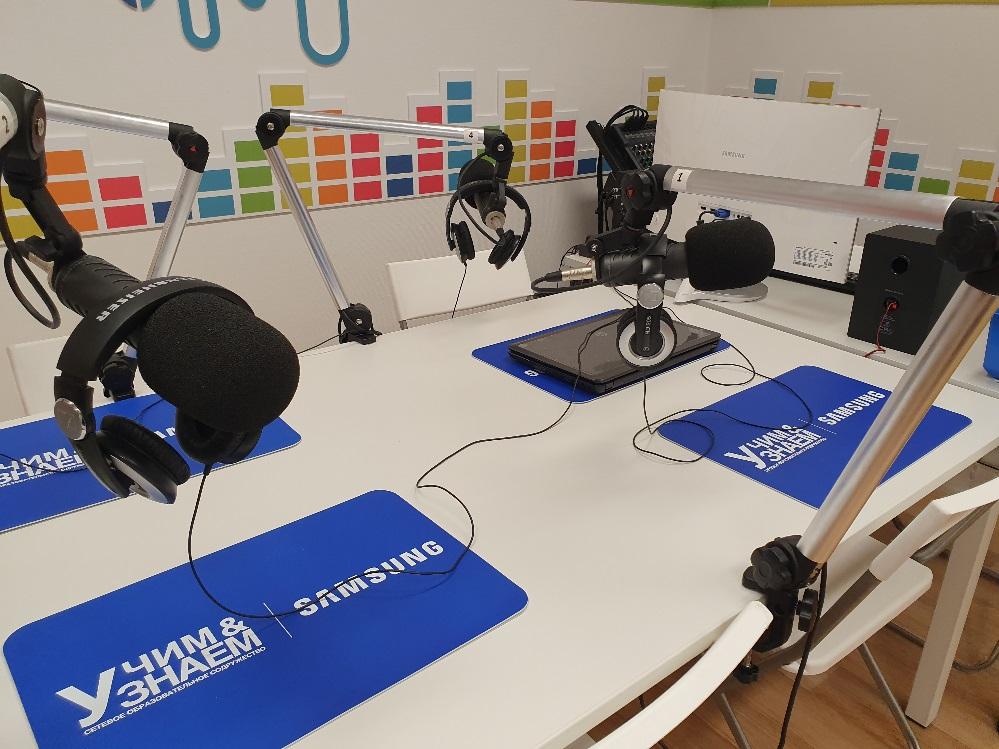
The studio is also career guidance: what is broadcasting, how to broadcast live ... The guys even have an idea to make a radio that broadcasts continuously for people in similar life circumstances. One of the students is now working on his audio blog in an interview format - wants to become a blogger.
And for those who are fond of music, there is a separate project “Music for Health”. In 2017, Lisa Petukhova fell ill, she studied in the 9th grade and always dreamed of singing. And then the idea of recording the album “Stars for Lisa” was born, professional musicians helped her to record it.
She is doing well now.

Photo source: school 59 of the city of Cheboksary
A year later, the young violinist William Hailo got to school. And now a new project - "William - with a love of music." William recorded his solo album, as well as a film about how it was recorded. According to William, the next thing he will strive for is the dream of becoming as great a musician as his idols - Gergiev, Spivakov, Matsuev. Now William Spivakova, a scholarship holder of the International Charitable Fund, is the winner of the All-Russian contest “Young Talents of Russia”. He dreams of helping other children who find themselves in difficult life situations find their great goal in life!
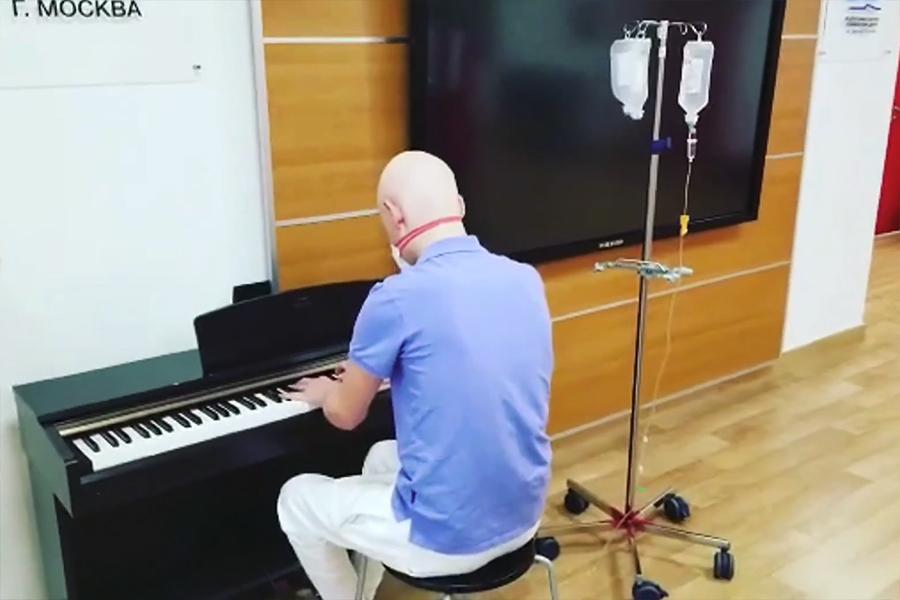
Photo source: Learn
A separate topic is parents. Parents on whom grief falls. Most often, these are mothers, because according to statistics in the Oncoprofile, only 20% of men remain in the family. They do not stand, leave, and it is good if they help financially. Moms are depressed. And children often show more strength, they also support moms.
The teacher needs to be able to work with parents, one must be prepared to face emotional aggression on their part, being in the most severe stress, sometimes they just have nowhere to pour out overwhelming feelings.
A few years ago, in the UchimZnayem project, a new opportunity was opened for parents - to take the professional retraining program “Tutoring Support for Sickly Sick Children”. After losing a job for many, this is a new perspective, meaning and purpose appear. The training program for tutors is implemented jointly with the Moscow City Pedagogical University. In June of this year, diplomas were awarded to graduates of the fourth issue of the program!
Whenever possible, parents are involved in a caring school. For example, at the last graduation party, as a congratulation, the parents prepared a video skit, the audience simply exploded with laughter.
This year, the school on the basis of the National Medical Research Center of Pediatric Hematology, Oncology and Immunology. Forty graduates received a diploma of secondary education from Dmitry Rogachev.

At the graduation ball on some graduates droppers are imperceptibly connected, 06/22/2019
Evgeny Aleksandrovich Yamburg, director of School No. 109, says: “These guys passed the exams brilliantly, there are medalists. For graduates of hospital schools, this is a matter of principle. If ordinary graduates, and especially their parents, often whine about the stress of the exam, which harms the psyche of adolescents, then children who are ill for a long time want to take an exam! They want to be on an equal footing with their healthy peers and have the right to it. ”
If you liked the heroes of this material, watch the documentary “The Protocol of Understanding” about them, which was released just the other day. There are interviews with children and teachers, their thoughts about life, death and dreams.
And if you are interested in the Uchem Znayem project, subscribe to its pages on social networks ( Instagram , Facebook ), go to the site , find out the news.
Let's start with the facts. In our country annually over 250 thousand children undergo long-term treatment in clinics. The most severe cases are organ transplants, oncology. At the same time, in our country, according to statistics, in 80% of cases, pediatric oncology is completely cured, unlike adults, where it is about prolonging life. The treatment and rehabilitation of such children is a long process that lasts for months and sometimes years.
We want to tell you a story about amazing schools and the people who live by them, and about those for whom this project exists - children and their loved ones. For them, school is not only education, it is HOPE for the future and great courage!

Teacher Perushkina Alexandra Pavlovna works
A breakthrough in the treatment of children with malignant neoplasms occurred in the 90s of the last century, when Western protocols and methods of intensive treatment of childhood tumors came to Russia. Today, oncologists have achieved impressive treatment results in large centers: with lymphoblastic leukemia - 80% of the cure, with some of its types - more than 90%, with Hodgkin's lymphoma - almost 95%, with Wilms (kidney) tumor - almost 90%. In addition, the quality of diagnostics has improved in the country: in 2018, according to RBC, 26.9 thousand children were registered with oncologists, for comparison, in 2008 it was 16.6 thousand.
And so, having passed through trials and defeated a serious illness, the children returned home. And at school, they face new stresses due to lagging behind the school curriculum and the inability to return to their native class with friends. And if exams are coming at the end of the year, then you can say goodbye to the dream of successfully passing the exam and the exam.
In 2014, Sergei Vitalievich Sharikov created the UchimZnayem educational community to solve the issue of affordable full-fledged education for students undergoing long-term treatment. With Samsung technical support, the first school was then organized on the basis of the Dmitry Rogachev National Medical Research Center for Pediatric Hematology, Oncology and Immunology in Moscow.
For 5 years, the UchimZnayem project was able to achieve a lot, for example, they achieved that children in clinics were allowed to pass state certification exams. With the support of federal and local governments, schools have been opened in clinics in 19 regions of Russia: Moscow and the region, St. Petersburg, Astrakhan, Voronezh, Zabaykalsky Krai, Kaliningrad, Leningrad, Oryol, Rostov Regions, Sverdlovsk Region, Krasnodar, Krasnoyarsk, Perm, Primorsky and Khabarovsk Territory, the Republic of Komi, Sakha, Udmurtia, and their number continues to grow. Today in Russia there are already 33 classes of the project.
It’s impossible to say better why hospital schools are needed, the inspirer and leader of the project, Honorary Worker of General Education of the Russian Federation Sergey Vitalievich Sharikov: “When we started to rebuild the system of hospital pedagogy in our country, we immediately realized what should be wrong. School is about life, and not only and not so much about passing the exam.
You see, when something hurts, often because you don’t want to see anyone, you want to go under the covers and close. And our system should lead to the fact that the child, if he can get up, get out of bed, comb his hair, wash, go out into the hallway, into the classroom. We must be more than education by our system. We must show that life goes on, no matter what.
We are trying to answer the question, which at first seems absurd: "What can be good in a children's hospital?" A good must be found! Since this happened, since you are here for a long time. It’s impossible to think about the bad all the time: our “caring school” should become such a good friend, who, like an outbreak, should “ignite” the child, and parents too, to distract from focusing on health problems ”
Let's look at the construction of one such hospital school in the center named after Dima Rogachev.
About the Dmitry Rogachev Medical Center
Dmitry Rogachev National Medical Research Center for Pediatric Hematology, Oncology and Immunology is located in the south-west of Moscow. Often, children cannot receive high-tech treatment of the appropriate level in their region, and therefore they are sent for free treatment to this center. The UchimZnaem school is a structural unit of the Moscow school No. 109, which is headed by an academician of the Russian Academy of Education, Ph.D. Evgeny Alexandrovich Yamburg.
Sad fact: the medical center is almost always close to 100% full. The center is able to receive up to 700 primary patients per year, and cancer in Russia is diagnosed for the first time in more than 5,000 children annually.

The center has the most advanced equipment, its construction took into account modern standards. During treatment, children can live in rooms that are suitable for living with a close adult. For obvious reasons, this is incredibly important for regional patients sent to Moscow for treatment, whose relatives have nowhere and expensive to live in the capital.
The design of the school wing of the center is designed in bright colors.

Visitors to the center can have a snack in a cozy cafe.

There is a very bright game room:

To fight for life, you need to love it!
Hospital School Teachers
In preparing this material, we talked with the teacher Elena Kuznetsova, thank you very much for the time taken.

Photo source: All-Russian Children's Center "Ocean"
Elena Kuznetsova, teacher-tutor of mathematics at the flagship school at the Medical Center. Dima Rogachev. She is one of the main Russian speakers on the topic of rehabilitation pedagogy at major educational conferences. Winner in the special nomination "For long-term and creative work with children who are on long-term treatment in children's hospitals" of the competition "Teacher of the Year 2017". When you are near, you involuntarily wonder why some people have many times more internal energy? Where does it come from? Who can work in a hospital school?
In an interview, Elena said: “My indefatigable energy in another place annoys people, but there is an application, there are always few. Here, like a black hole, here you can give, give and give. These children, they absorb like sponges, they absorb your vitality, they absorb your love for people, for the world. That's all there is - they absorb, they miss theirs because of the difficult treatment, and therefore that's how much you are willing to give, so much they are ready to take. ”
According to Elena, any situation needs to be able to be turned into a pedagogical one. Those realities that teachers in such a center face daily:
- The child found out his diagnosis
- The child has a difficult medical procedure
- Baby fainted
Read Elena ’s article “Seven Challenges in Hospital Education” .
And another quote from Elena: “There is no concept of an oncological teacher ... we must very accurately understand what the child experiences at each stage of treatment in order to help him overcome these problems. Because if he has chemotherapy, he just forgets everything. If at this moment you try to give tasks for memory, we will fail. Okay, we, child, we not only injure him, but practically push him in this direction. And we have to do this: "Yeah, you have chemistry, so today we are engaged in art mathematics, we draw graphs." So we study constantly, we collect bit by bit "
When asked about burnout, Elena replies: “When do people burn out? When they start to close. Everyone has their own ways to escape. For someone it comes in a year, for someone in five, for someone it doesn’t come at all. There are ways to restore: psychologists work, there is a Playback Theater (experiencing personal stories through playing them in actors in an improvisational theater - approx. Ed.) ”
Elena Kuznetsova says that people who work in such places, in a different way, should feel other people more acutely: “You pass by, and there in the corridor are mothers, sometimes mothers of those children whom I don’t even teach. In a normal situation, one could pass by. Here I’m not something I can’t afford to ... it’s natural to communicate with mothers, empathize with these children, react to the state of the child, and evaluate feedback. You can’t work here if you don’t give. ”
Information is very important!
In a hospital school, a teacher becomes partly a doctor: willy-nilly, you need to know what happens to the patient. Medical lectures are held here. For example, just at the time of the interview, a lecture was held about T cells, about cancer immunotherapy - this is something new that happens in medicine, for which James Allison and Tasuko Khondze received the Nobel Prize in 2018.
The idea of immunotherapy is to train immune cells to fight cancer (you could say to program them). After all, how is cancer? In general, every person has cancer cells. The question is what the immune system does with these cells. It is believed that cancer is a disease of the age when errors accumulate, i.e. to die of cancer at 80 is natural. But then why do children fall ill with oncology? It is still not known exactly, but there are studies that suggest that it does not depend on living conditions, unlike adult oncology, violations are laid back at the time of embryonic development. Therefore, pediatric and adult oncology have a different course of the disease and a different percentage of recovery.
Families with children with cancer really need information. It is important for children and their relatives to talk about the disease in a popular way, to explain the complex treatment process, so that they become conscious medical assistants in their own recovery. Special books are published, such as in the Charity Book Aid series. Here, for example, is the wonderful book “Crank”, where in the format of a story about a sick boy, Crank and his mother explain in simple terms what a biopsy, catheter, tomography, chemotherapy are. Its author is the hematologist Anastasia Rudneva, and she also works in this center.


You can download this and other books on the Book to Help website for free, and useful tips are also published for those who want to help, for example, “How to Support If Your Child Has Cancer” .
Distance learning
In the schools of the “Teach-Know” project , everything is built so that treatment and study can be combined.
In the process of oncological treatment, there are periods when a child, due to reduced immunity, must sharply limit contact with the outside world in order to protect himself from infections (therefore, patients and visitors wear masks).
And here the distance learning technologies are perfectly suited: tablet, headphones, and more! A lesson can be held individually with a teacher or even as part of a group: during a lesson in a classroom, you can connect to it remotely.
Or another situation: the child has a pause in treatment, and he went home. How to ensure the continuity of the educational process? Again, an online educator is involved with him.

Elena Kuznetsova conducts a lesson on Skype. Source: onkobook.ru
The use of tablets, an electronic board in classrooms is associated with the requirement of sterility (a book cannot be decontaminated, for example).
Training class as coworking
Classes are very interestingly arranged. In one class, several children of different ages sit at once, and each is engaged in their own subject. For example, here in the photo: a mini-group of preschoolers goes through the theme of “letters”.

At the blackboard - Khachatryan Diana Lvovna, engaged with a child in the foreground - Atly Oksana Borisovna
At the same time, other older children study Russian language and literature - and each has his own teacher nearby (pictured is the boy on the right). That is, this is an individual training, but at the same time everything is in one room, and there is no feeling of isolation and loneliness.
And here there is almost coworking, where the guys, even with a dropper connected, can come to study with a teacher, the atmosphere here is very free.

Works teacher Kurilovich Natalya Sergeevna
For obvious reasons, they can’t put many lessons a day. Here is an example of a girl’s 9th grade schedule — no more than three lessons per day.

Secrets of Teaching Math
In teaching mathematics at Elena, the Lego constructor proved himself very well. On it, you can explain the fractions, and the radius with a diameter using the wheels of a typewriter as an example, and go to physics through speed and time.
Elena explains: “Lego” is good here, because children with such treatment have a problem - deprivation, including kinesthetic - and they are returned to the world of sensations through a game with a constructor. Instruction - assembly: eye-hand connection, this is also lost in case of illness, and this can also be returned through classes.

Another important point why Lego is used is motivation. And healthy children often have a dislike for mathematics, and here there is a huge physical and psychological fatigue. And they need to be interested in the game. Which child will refuse to play at school? And they not only play, but they themselves come up with tasks: and let's do the assembly for a while? And let's do the assembly in pairs? In pedagogy, this is aerobatics: when a child sets a pedagogical goal for himself.
For older children there is even a “smart greenhouse”: relays, pumps, microcomputer board. True, there was a small incident with the greenhouse: it was moved from another place, but here, in a hospital school, nothing can be grown: this is the requirement of doctors. Therefore, now we think that it is possible to do interesting things with it, so that without plants.

Educational robotics for rehabilitation tasks here has an understandable and logical application: ergonomic (there are no jagies, irregularities), methodically and design-designed, convenient, compact. I took a box with me and went to the lesson.

In Elena’s lesson, using a constructor, she was assisted not only by her second teacher, Nikita Korovin, but also by a girl named Masha, who herself was not much older than the students. It turned out that Masha was a new tutor, and she wanted to go through something like a pedagogical internship with Elena.

And Nikita said that he and his colleague are now doing a set of laboratory work in physics using Lego and demonstrated one of the lessons - the concept of leverage. Children are madly in love with conducting physical experiments and finding out how physics is in their environment.
As you may have noticed, the methods that we see in the hospital school are generally needed by all children: an individual approach, learning space like coworking, distant learning, mentoring. Here, these decisions are worked out with many external constraints, in changing and difficult conditions, and become a vital necessity. It would be useful for everyone who works with children to get acquainted with hospital pedagogy.
Art in service
The caring school has a well-equipped audio studio where children can try themselves as radio hosts. The idea is to help children compensate for cognitive loss (due to chemotherapy) and recover over time. Regular classes are important for this, you need to read aloud, repeat, recite verses.
And another idea that comes to mind is the theater. It is difficult to stage a theater performance here: students are embarrassed by public appearances because of their changed appearance. And making costumes for the performance is problematic due to clothing requirements - asepsis. Therefore, radio plays are staged here!

The studio is also career guidance: what is broadcasting, how to broadcast live ... The guys even have an idea to make a radio that broadcasts continuously for people in similar life circumstances. One of the students is now working on his audio blog in an interview format - wants to become a blogger.
And for those who are fond of music, there is a separate project “Music for Health”. In 2017, Lisa Petukhova fell ill, she studied in the 9th grade and always dreamed of singing. And then the idea of recording the album “Stars for Lisa” was born, professional musicians helped her to record it.
She is doing well now.

Photo source: school 59 of the city of Cheboksary
A year later, the young violinist William Hailo got to school. And now a new project - "William - with a love of music." William recorded his solo album, as well as a film about how it was recorded. According to William, the next thing he will strive for is the dream of becoming as great a musician as his idols - Gergiev, Spivakov, Matsuev. Now William Spivakova, a scholarship holder of the International Charitable Fund, is the winner of the All-Russian contest “Young Talents of Russia”. He dreams of helping other children who find themselves in difficult life situations find their great goal in life!

Photo source: Learn
Parents
A separate topic is parents. Parents on whom grief falls. Most often, these are mothers, because according to statistics in the Oncoprofile, only 20% of men remain in the family. They do not stand, leave, and it is good if they help financially. Moms are depressed. And children often show more strength, they also support moms.
The teacher needs to be able to work with parents, one must be prepared to face emotional aggression on their part, being in the most severe stress, sometimes they just have nowhere to pour out overwhelming feelings.
A few years ago, in the UchimZnayem project, a new opportunity was opened for parents - to take the professional retraining program “Tutoring Support for Sickly Sick Children”. After losing a job for many, this is a new perspective, meaning and purpose appear. The training program for tutors is implemented jointly with the Moscow City Pedagogical University. In June of this year, diplomas were awarded to graduates of the fourth issue of the program!
Whenever possible, parents are involved in a caring school. For example, at the last graduation party, as a congratulation, the parents prepared a video skit, the audience simply exploded with laughter.
Conclusion
This year, the school on the basis of the National Medical Research Center of Pediatric Hematology, Oncology and Immunology. Forty graduates received a diploma of secondary education from Dmitry Rogachev.

At the graduation ball on some graduates droppers are imperceptibly connected, 06/22/2019
Evgeny Aleksandrovich Yamburg, director of School No. 109, says: “These guys passed the exams brilliantly, there are medalists. For graduates of hospital schools, this is a matter of principle. If ordinary graduates, and especially their parents, often whine about the stress of the exam, which harms the psyche of adolescents, then children who are ill for a long time want to take an exam! They want to be on an equal footing with their healthy peers and have the right to it. ”
If you liked the heroes of this material, watch the documentary “The Protocol of Understanding” about them, which was released just the other day. There are interviews with children and teachers, their thoughts about life, death and dreams.
And if you are interested in the Uchem Znayem project, subscribe to its pages on social networks ( Instagram , Facebook ), go to the site , find out the news.
All Articles